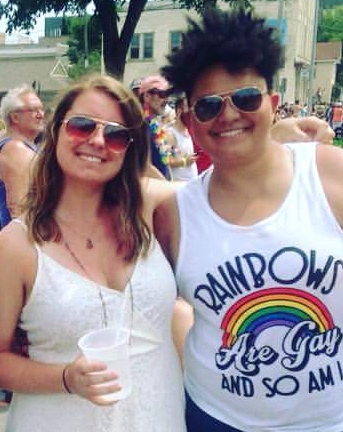Racism exists in lesbian, gay, bisexual and transgender (LGBT) communities, just as it does most everywhere else. It’s not an easy thing to talk about … so people often don’t. But for a little over a year now, Shawna Lutzow and Johanna Heineman-Pieper have been facilitating a monthly discussion group “Conversations about Racism in Queer Communities” at the OutReach LGBT Center to raise awareness and start important conversations about race.
“It’s true. It’s something that people generally don’t talk about,” Lutzow tells Madison365. “But it’s so important that we do.”
“Ultimately, we want to get more people talking about this in an everyday way to approach racism in the queer community,” adds Johanna Heineman-Pieper. “Shawna and I have conversations over dinner about certain things that we have noticed – we can see racism all the time. I think the more it’s talked about, the more comfortable people will feel addressing things that come up and being aware of different policies and changing systems.”
Two years ago, Lutzow and Heineman-Pieper went to the annual White Privilege Conference in Philadelphia together and had a really amazing experience.
“At the conference, they had a lot of great workshops and learning sessions focused on white privilege and racism, systemic racism and inequality … and they have caucus groups where you can process with people of the race that you identify with,” Lutzow says. “We noticed that there weren’t many offerings for queer people and as an interracial queer couple, we were hoping that there would be a space for us to process together.”
Lutzow and Heineman-Pieper decided to apply to facilitate a couple sessions focusing on racism within the queer community at the following year’s White Privilege Conference in Kansas City.
“They approved our proposal and we did two sessions at this huge conference and we thought to ourselves, ‘You know, we should probably bring this back to our hometown and start to actually do something there and provide the space and opportunity for conversation there,’” Lutzow says.
With that, Conversations about Racism in Queer Communities was born. OutReach LGBT Center agreed to provide the free space in its conference room for the group to meet but does not facilitate or create the agendas of content for their meetings.
“We’ve been doing it every month for the last year,” Lutzow says. “We have different topics at each meeting within the realm of racism that we focus on. It’s still a work in progress, but we find that it works best when we have a specific topic and someone presenting or speaking … that seems to be a model that brings more people in.
“It’s been between 3 people and 30 people each time. The attendance has varied,” she adds. “We’ve had presenters like M Adams of Freedom Inc. talking about how police killing black people is a queer issue and showing us those intersections. We’ve had topics like: Should we have police at Pride [Fest]? Our topic this weekend will be about religion.”

The reception has been very good so far for the monthly event that features top-notch presenters followed by frank discussions.
“There’s been one comment made on one of our Facebook events saying, “Why are we talking about this? We’re just making it worse?’ and ‘What about racism against white people?’” Lutzow says. “But overall, it’s been great. The response and the feedback has been terrific.”
“I think during the actual discussions there’s such a wide range of where people are at, but the purpose of the group is to have people come together and have a safe, open space for everyone to increase their knowledge and awareness,” Heineman-Pieper says. “So everybody kind of comes in with an open mind and an open heart and sometimes if somebody is triggered by something someone has said, then we try to do our best to give them a space to talk about that and how it made them feel. We have a lot of ground rules that we lay out and I think that really helps.”
It can be a thin line making sure that people aren’t so defensive that they are unwilling or afraid to talk while at the same time bringing to light the uncomfortable facts about racism.
“The term ‘white supremacy’ isn’t often in people’s everyday language and we want people to understand white supremacy as a systemic issue as opposed to an individual racist person,” Lutzow says.
The next “Conversations about Racism in Queer Communities” will take place this Saturday.
“Hopefully, by talking about this issue more and more it will kind of snowball and more people will become aware of systemic racism,” Heineman-Pieper says. “It shouldn’t be the burden of people of color to just constantly be fighting with everyone about racial issues. It can be challenging and exhausting.”




























